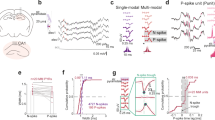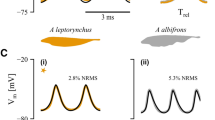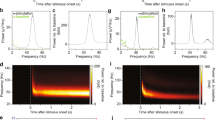Abstract
ALTHOUGH intracellular recording from excitable cells has a thirty-year history, such recording from coelenterate tissue has only recently been achieved1–4. Mechanical dissociation of previously separated endodermal and ectodermal epithelial layers of Hydra produces a preparation permitting intracellular recording from identifiable classes of cells (Fig. 1). Elicited and spontaneous potentials occur in the cells of both epithelial layers. We have recorded small rhythmically occurring pulses from endodermal cells with positive resting potentials; large spikes from ectodermal cells with negative resting potentials, and regularly occurring membrane oscillations from both types of cells.
This is a preview of subscription content, access via your institution
Access options
Subscribe to this journal
Receive 51 print issues and online access
$199.00 per year
only $3.90 per issue
Buy this article
- Purchase on Springer Link
- Instant access to full article PDF
Prices may be subject to local taxes which are calculated during checkout
Similar content being viewed by others
References
Spencer, A. N., Nature, 233, 490–491 (1971).
Patton, M. L., and Passano, L. M., Am. Zool., 12, XXXV (1972).
Mackie, G. O., Publ. Seto mar. Biol. Lab., 29, 745–756 (1973).
Mackie, G. O., J. gen. Physiol., 67 (1976).
Papenfuss, E. J., and Bokenham, N. A. H., Biol. Bull., 76, 1–6 (1939).
Gierer, A., Berking, S., Bode, H., David, C., Flick, K., Hansman, G., Schaller, H., and Trenker, E., Nature, 239, 98–101 (1972).
Lilly, S. J., J. exp. Biol., 32, 423–439 (1955).
Benos, D. J., and Prusch, R. D., Comp. Biochem. Physiol., 40 A, 555–561 (1971).
Campbell, R. D., J. Cell Biol., 63, 47a (1974).
Schwab, W. E., Josephson, R. K., Rushforth, N. B., Marcum, B. A., and Campbell, R. D., 3rd Int. Synp. Coelenterate Biol. (1976).
Kass-Simon, G., Passano, L. M., Am. Zool., 19, 1113 (1969).
Loomis, W. F., and Lenhoff, H. M., J. exp. Zool., 132, 555–573 (1956).
Passano, L. M., and McCullough, C. B., Nature, 199, 1174–1175 (1963).
Passano, L. M., and McCullough, C. B., J. exp. Biol., 42, 205–231 (1965).
Nelson, P. G., in Tissue Culture of the Nervous System (edit. by Sato, G.), 135–160, (Plenum, New York, London, 1973).
Werblin, F. S., and Dowling, J. E., J. Neurophysiol., 32, 339–355 (1969).
Bülbring, E., Lectures on the Scientific Basis of Medicine, 7, 354 (1957).
Passano, L. M., and McCullough, C. B., J. exp. Biol., 41, 643–664 (1964).
Strumwasser, F., in Invertebrate Nervous Systems (edit. by Wiersma, C. A. G.) 291–319 (University of Chicago, Chicago, 1967).
Author information
Authors and Affiliations
Rights and permissions
About this article
Cite this article
KASS-SIMON, G., DIESL, V. Spontaneous and evoked potentials from dissociated epithelial cells of Hydra. Nature 265, 75–77 (1977). https://doi.org/10.1038/265075a0
Received:
Accepted:
Issue Date:
DOI: https://doi.org/10.1038/265075a0
This article is cited by
-
The photobiology of Hydra’s periodic activity
Hydrobiologia (2004)
-
Modulation of Hydra Attentuata rhythmic activity
Biological Cybernetics (1987)
-
No junctional communication between epithelial cells in hydra
Nature (1980)
Comments
By submitting a comment you agree to abide by our Terms and Community Guidelines. If you find something abusive or that does not comply with our terms or guidelines please flag it as inappropriate.



